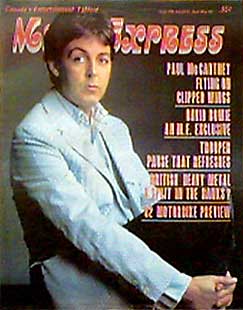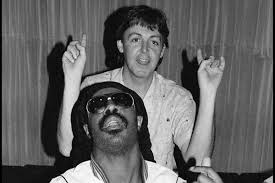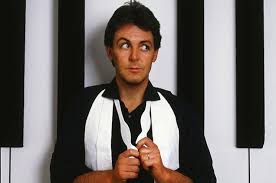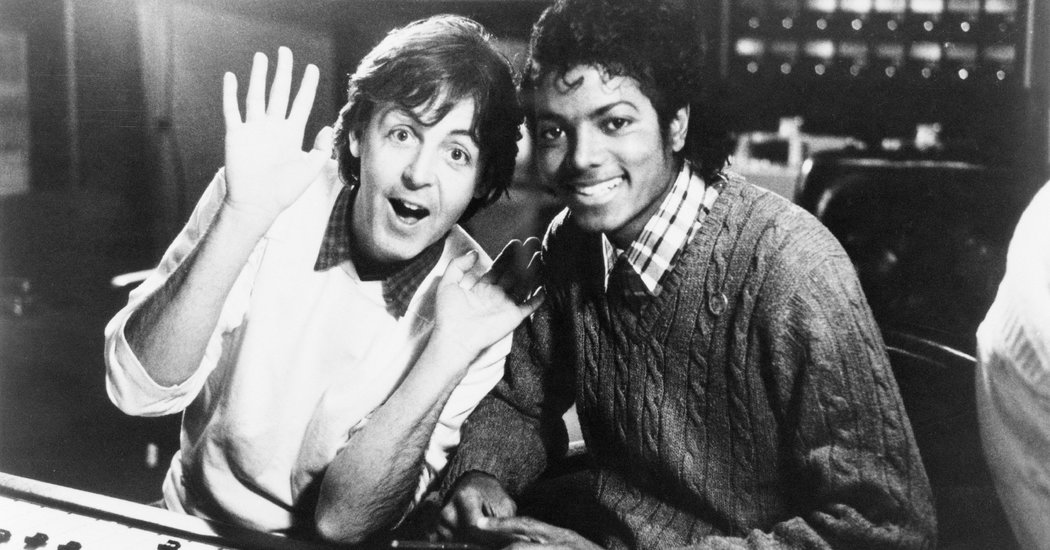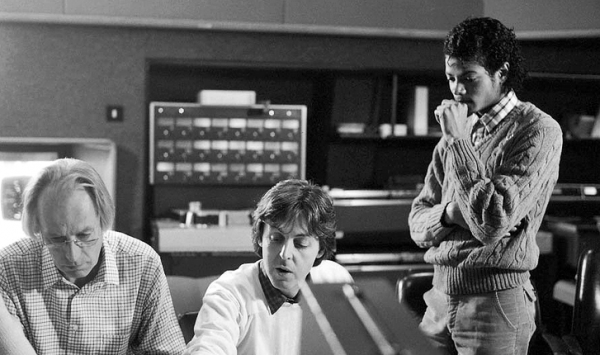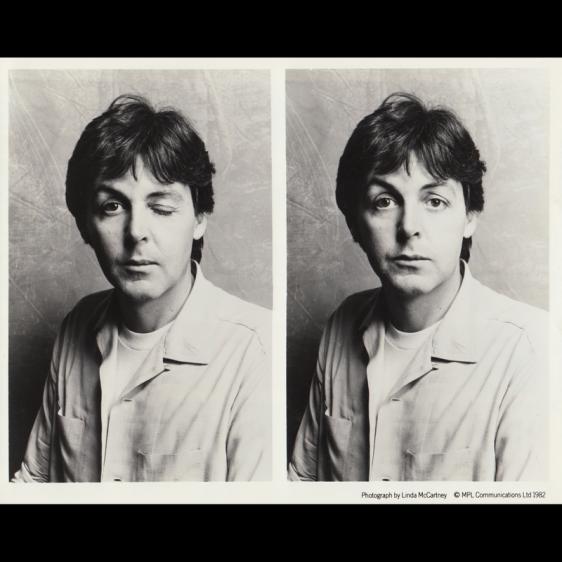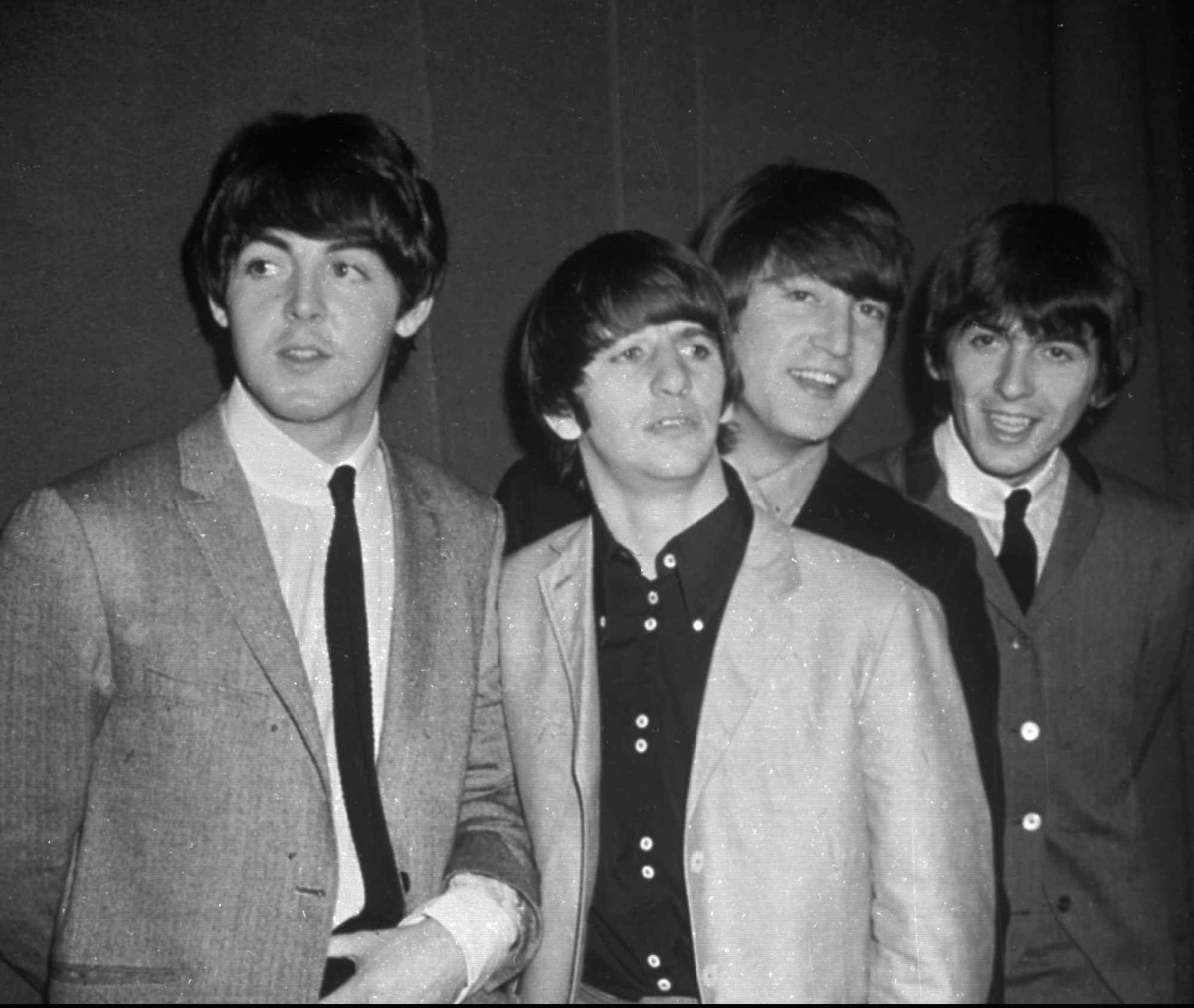Editor’s note: My little girl is taking piano lessons and recently received an Easy Piano Beatles Hits book, which strips the songs down to their most basic form. I was struck by how good the compositions are. Just more appreciation for the most celebrated composers pop music has ever known.
ABOUT THIS INTERVIEW: In their April/May 1982 issue, the Canadian music magazine Music Express featured an exclusive interview with Paul McCartney. Ray Bonici chatted with Paul about Denny Laine and the breakup of Wings, Elvis Costello, the Beatles, John Lennon’s death, and Paul’s forthcoming LP, Tug Of War. The album was released on April 26th.
Q: “You seem to be Wingless at the moment. Is this a ‘back to the egg’ situation for you?”
PAUL: “Not really. I felt a bit limited working with the group and I just didn’t fancy going in and making another group album. So I decided to approach it in another way– to take each song and ask myself, ‘Who would the best drummer be to work with for that kind of song?’ I cast them all. It was something I’ve never done. So instead of getting the group and just working with a one bunch for a whole album, which I’d done plenty of times, I just fancied trying it this way. So I grabbed Steve Gadd for a couple of sessions and Ringo for a couple of others and just grabbed people according to their styles. The album is like a star-studded cast of thousands, which, to me is a little bit of a drawback, if anything. Normally I don’t like albums with huge casts on them… like supergroups.”
Q: “You are known for criticizing such projects and accusing certain high profile musicians of being weird. In fact, the musicians in Wings were more or less unknown at first.”
The Beatles – from left, Paul McCartney, Ringo Starr, John Lennon and George Harrison – are shown in this November 1963 photo. (AP Photo)
PAUL: “They were never really faces. When I was getting the group together I didn’t want a permanent group of superstars. I still don’t think I would want that. Just for a one-off thing like this, I felt it would be good. So anyway, I tried it and I found I enjoyed it. When the session was over and when we’d done the music, there wasn’t a huge on-going thing. You just say, ‘Thanks,’ and if you liked it you could ask them back. I ended up doing that, and met Stevie Wonder and sang with him.”
Q: “You must have fulfilled your ambition at last. You always admired that guy.”
PAUL: “I always wanted to do all that kind of stuff, but I didn’t think I should do it for some particular reason, or because I didn’t care to do it. So I just said, ‘Oh sod it! I’ll just do it.’ I’ll try and make a good album and concentrate on the music and not worry about styles, not worry that it’s a new album, not worry about the normal things I go into an album worrying about.”
Q: “But does Wings still exist?”
PAUL: “No, not really. We sort of disbanded for this album. If we’re going to pick it up again we should just be loose enough to come together again or not. You see, I hate the pressure of a group.”
Q: “But you have done it. You’ve been in a group since the Beatles anyway.”
PAUL: “Yeah, I did it. That’s right. I did it with the Beatles. Towards the end there was a bit of a pressure but I never really felt it. I just felt the positive side of the group. But with Wings, with so many changes in the line-up, it wasn’t so easy. That often distracts you from the music and you start thinking a whole load of other things. You’re thinking about the group image. Anyway, I got bored with the whole idea and I thought, ‘Christ! I’m coming up to 40 now. I don’t really have to stay in a group. There’s no rule anywhere that says I have to it that way.’ At that time Denny Laine was staying with me. We were writing together. He was going to stay on but we had a bit of a falling out. It was nothing madly serious, but he did decide to go his own way, saying that he want to go on tour. He hasn’t been on tour since… (laughs) However, he wanted to get his own thing together.”
Q: “It seems that there was definately a hatchet floating about and that it wasn’t buried as you had said. The arguments are still there.”
PAUL: “With Denny? There were little personal things here and there, little things that were just niggly. In the end it blew up a bit. It was a bit of a number. We didn’t part shouting at each other or arguing. We both decided that it would be best… in fact, it was his own decision. I can never remember these things because once they’re gone they’re gone. It was his decision. He rang up saying that he was going out on his own to get his own stuff together. He thought he’d be happier that way. I just said OK and kept on with this album. Seeing I was doing it this way, working with other people, there wasn’t the normal big trauma: ‘What? Somebody hasn’t turned up? Oh God!’ Or, ‘Are the lights here?’ ‘Yeah, but the drummer isn’t!’ Panicky stuff. You just spend all your time worry about that. I decided that all I really am interested in is the music anyway, and not in huge personality things.”
Q: “One thing Denny said was that he was doing hatchet jobs for you on other musicians.”
PAUL: “But Denny has got his own theory about what happened all the time. As far as I’m concerned, there were no hatchet jobs, ever, and if there were, it certainly wasn’t Denny that went around doing them. Maybe there was one case where he had to do it. I don’t know. These stories grow so madly, you know, from just one little line. There weren’t any big hatchet jobs. Denny Seiwell left of his own accord. I’m sure I could go through the whole line-up. It’s a bit boring really, and a bit of a yawn. With the last Wings line-up we parted in a friendly way. Everyone was a bit disappointed and I was a bit sad because that was it… because it was a bit of a burden. It’s like a marriage you’ve got to keep up. It becomes a very real thing.”
Q: “You are the only one who went back into a group after the Beatles. John, George and Ringo did their stuff with other musicians. Now you’re doing it for the first time. Do you regret not having done this earlier?”
PAUL: “Yes. It would probably have been a good thing to start it then. At the time I felt that it was a bit too predictable, that everyone would leave the Beatles and go with old Phil Spector or the drummer, Jim Keltner. It was like a clique and I just didn’t want to join that clique. The decision I made was mainly to get the group together to play with because, with the Beatles, we weren’t really playing alot. I thought of doing that after I had seen Johnny Cash on TV and I wanted a similar group with a couple of guitars and drums just to have sung with. That’s what I did.”
Q: “The last time we talked I brought up the subject of your producer’s instinct and your dictatorial attitudes– the dictator being the perfectionist in you– the musical ear. Could it be that with Wings you were not personally satisfied with the music that was being produced?”
PAUL: “And that’s why I knocked it on the head, you mean? Yeah, probably that kind of thing.”
Q: “Are you dictatorial outside of music?
PAUL: “I don’t know. I don’t examine myself that way. I just am. I just go through it. I just wake in the morning and go to bed at night and whatever happens during the day just happens. I don’t really know how I am. In fact, I’m always getting rude awakenings. John’s saying I hurt him and I did this to him and that to him was always a rude awakening. I’d never thought about that kind of stuff. It was just the way I was and the kind of family I was from. It was very much different scene from how John was raised. So I must have rubbed him up the wrong way many times without even knowing, and he was probably more sensitive. But listen– he did it all to me, too. I’m not taking the blame for anything. We just busted up because it busted up. I don’t think I go around trying to be a dictator. In fact, I’m just the opposite, really. If anyone said, ‘Oh, you bloody dictator,’ I’ll say, ‘OK, you do it then.’ I really don’t want that responsibility at all.”
Q: “You’re not a dictator in the public eye, but ‘Paul, the nice guy’ all the time. Even John called you ‘honest little Paulie’ and ‘the walking, glossy PR guy.’ How do you feel about that?”
PAUL: “I never realized I was reflecting that image. As a kid, I watched the telly to see how they did it, and watched films to see how the world went. You pick up on all these things. If they smoked in the films, then you smoked. You just see what was the cool thing to be. To me, that PR thing I just automatically thought we needed in the Beatles, to get on and to meet people and the Press. So, I would do a lot of that because no else would. It’s the truth. John would never do it and George wasn’t into it and Ringo would if he liked you, but I’d do it even if I didn’t like you. All the Press people we’d see I would bring in and say, ‘Come on!’ I knew they were nervous. I don’t like nervous people around. Who does? I mean, nervous people hate to be nervous but it’s something they can’t help. So I try and cool the situation out and say, ‘Let’s have a cup of tea, OK? Come on now, sit down.’ Alot of Liverpool people are very good at that. Maybe it’s not always genuine, but my Auntie Jenna always called me polished. She said, ‘You are really polished, you are,’ but in a way she kind of liked it. Over years and particularly with John coming out against me like that, it was no good for me at all. He really slagged me off, alot of which he really didn’t mean. He said it in interviews, and I’ve talked a lot to Yoko since, and she tells me that lots of it was just John. Alot of it was his own… he just wanted to put me down. He said, ‘Everyone is on the McCartney bandwagon.’ You know, you get jealous.”
Q: “But he was laughing as well when he was doing it, even when he said, ‘The only thing you done was Yesterday.’ He said in interviews that he was shitting himself with laughter doing it.”
PAUL: “That’s right. (laughs) It’s all jokes, taking the piss out of me. That was John. That’s his particular thing and that’s what I liked him for. But I think it has probably made my image worse than it is. As I say, the truth is he didn’t really think that was all my character. He knew there were all sorts of other bits. But I think it’s true. I sometimes do catch myself and think, ‘God do I look like that?’ Or, ‘Is that how I come over people.’ And the funny thing is, I’m just struggling, trying to get through life okay, and trying to do well, like lots of other people I know. I just try to earn a living. Basically, I’ve never had a different philosophy than that. You get up in the morning and do your gig.”
Q: “You go out of your way to clarify things when they go wrong.”
PAUL: “Pure fear. Yeah.”
Q: “After the Beatles split, nobody said anything. Then you put up this question/answer thing in the sleeve of McCartney LP. Why?”
PAUL: “Now, see, that’s one thing that really got misunderstood. I had talked to Peter Brown from Apple and asked him what we were going to do about press on the album. I said, ‘I really don’t feel like doing it, to tell you the truth,’ but he told me that we needed to have something. He said, ‘I’ll give you some questions and you just write out your answers. We’ll put it out as a press release.’ Well of course, the way it came out looked like it was specially engineered by me. I was digging at John really. There was no other way I could say it because the question was: ‘What do you think of John and Yoko’s music?’ and I said, ‘Well, it doesn’t bring me alot of pleasure.’ It was political, depending on how I said it. I was trying to say something without really saying, ‘I hate them!’ I was trying to say, ‘Well, they are not too cool. As you can see I am a little cool on this.’ I was just trying to hate John… a bit. All this was included in the albums we gave to the press, but the word got ’round that I put this interview in the real albums, which I didn’t. But it got around that I put out this really cutting statement. Looking back on it now, and not being in the mood I was in in that period, going through all sorts of changes, I can see how it looked to ordinary people who didn’t have the problems I was facing. As I say, I just feel that I have a kind of knack for doing crazy things like that. It’s an unfortunate thing in my character. You know, your character kind of sharpens up when it becomes your image. Now for me, this is a very strange game really, to meet the press, deal with the media. You know, I’m not a publicist, but being in the group for all that long time, you learn a way of dealing with it. You become a media person on the other side of the media. Before I used to spend literally as much time as you do doing interviews. So you become that kind of person. The rest of the group really hated it with a passion.” “It’s funny what you are allowed to say in public. It’s weird. If someone comes up to me and says, ‘Fleet Street has got this story about you doing such and such,’ I really believe it all and I think alot of other people do too. John and Yoko definitely did. They took in all the cuttings all the time and weighed up the political situation. They played it very smartly. They were very good. But see, John had a more ballsy attitude. He cared less. Actually, this is the joke, he probably cared alot more. This is what I’m finding. You’d think I was the one who maneuvered everything– the perfectionist. I’m finding out many things these days about John. He took every cutting of every newspaper he was ever in. He looked at it and got very much into it.”
Q: “John had all the time to do it.”
PAUL: “Yeah, good on him too. That’s what he wanted to do. Great. But anyway, what I’m trying to say is that I always find myself explaining bloody crap. I mean the Japanese thing: people said to me, ‘But why did you take it in– and that much of it sitting right on top of the suitcase?’ Do you think I don’t ask myself that? I do. But I really hate being judged by the media. So really, I’d like to be a whole lot looser, but I’ve learned this whole game now and my reactions are almost instinctive, like a robot. One of the things I never realized about people is that it’s not very sympathetic not being too much of a loser. People like a loser, people like to feel there is something wrong with you. Now, with someone like me, I cover up what’s wrong. I’m just not the kind of character who could admit everything that’s wrong.”
Q: “Has your image affected your songwriting at all, your ego?”
PAUL: “No, I don’t think so. I think the songwriting is just my songwriting. It just comes out. I think everything about your life affects your songwriting. You are just a vehicle and it all comes through you. So you know, if your vehicle is in a certain state you’ll write that kind of a song, some of the time. It does actually affect me, but I really don’t feel it affects me mightily. But it must do. Some people still say, ‘I never thought you were like that.’ I tell you who suffers from this too, and that’s Linda. She’s totally the opposite to her image. I don’t know what people think of her. You meet lots of people. Tell me.”
Q: “People tend to say, ‘Is she really that snobbish?’ That’s how she’s often projected.”
PAUL: “You know, it it’s in your character to fake it, then you must fake it. There’s no way you can give in. You can’t change the spots– whatever the expression is. But when you really get to meet somebody who’s not reacting to a microphone or an interview, when you see them in their off-duty hours, that’s when you find out what they’re really about.”
Q: “You played with George recently, didn’t you?”
PAUL: “Not really, no. I just sang some stuff on ‘All Those Years Ago.'”
Q: “Do you regret that your life has become so public?”
PAUL: “I realized that a good fifteen years ago. I remember actually thinking when I went on holiday somewhere, ‘God I’d really better start thinking now about keeping a few countries aside where we don’t sell records. I won’t be able to go anywhere without being recognized.’ But now I think, ‘Really, I’ve reached the point of no return. There’s no going back.’ Even if I didn’t want to sing anymore, I’d just be like Greta Garbo or Brigitte Bardot. They both retired but you’d never know it. John said this to me a year before he died. He said, ‘Be careful what you wish for, it might just come true.’ That’s the way I look at it. I wished for all this and I got it. To regret it would mean I’d have to sit here and live with negative thoughts about it. I know that would only sink me. Even if I had feelings of regret my personality would not really let them out. ‘Look mate, you don’t regret it. Look on the other side,’ that’s me. Not to sink. I always used to do that instinctively, and not allow too many negative thoughts to surface.” “I think anyone who gets famous regrets it a bit because you don’t realize you’re really gonna get there. You always want to get there. I saw someone on telly saying, ‘I didn’t sell my soul to the devil,’ which I thought was great. She said, ‘I didn’t say ‘If you give me fame, Lord, I’ll give away my private life.’ You don’t. It just goes that way, and when people see you in the street and say, ‘Oooh it’s him off the telly,’ all you can respond with is, ‘Hello,’ or you can put your collar up and refuse to deal with it. So, coming back to your question, I don’t regret it. No.”
Q: “But the fact that I can go to that coffee shop there across the road and you can’t, surely that must be…”
PAUL: “Yeah, I hate that. I really do. I used to be big on that. That’s what I used to do all the time. I used to go on a bus. I remember when we got famous I said, ‘I miss going on buses,’ and George Harrison thought I was mad. George is really into cars and his dad was only a bus driver. George didn’t really understand what I meant about going on buses. He just didn’t like buses. He had a Ferrari, so what does he need a bus for? (laughs)
Q: “Now you’ve got it and now you’ve got to live with it.”
PAUL: “Exactly. That’s what I mean. I’m happy with it. Having asked for it and having worked for it, you can’t turn round when they give you the big prize and say, ‘No I won’t have that, I’ll just have a bun, thank you,’ or, ‘I’ll have a cup of tea instead of the champagne.’ You have to live with it, make it fun. If I snap in the next couple of years you’ll know that it was really too big a pressure. Somehow I manage. I take the train in from home and I never get hassled. I get in compartments with people and they look at me and recognize me. Sometimes they don’t recognize me.”
Q: “They don’t say, ‘Look, a McCartney clone!'”
PAUL: “I had one fellow in New York come up to me saying: ‘Hey, aren’t you the guy who plays Paul in Beatlemania?’ I said, ‘That’s right. I’m him.'”
Q: “What about the book your brother wrote, ‘Thank U Very Much’? He’s back to calling himself McCartney. A couple of years ago you had a tiff with your step-mum because she went back into show business under the McCartney name. I understand you weren’t so happy about these things.”
PAUL: “Yeah. It’s a pity, all that stuff. The worst thing about it is that it spoils immediate personal relationships. When I meet those people, I start thinking, ‘Well, I’ve gotta watch what I’m going to say now because it might be in the next book.’ You do get a feeling that they’re sort of hanging on and living off you, which is not a nice feeling. It’s very hard for a brother of someone like me to cope without doing something like that, if he sort of needs some money. If someone asks him to write a book, why shouldn’t he– especially if he’s a good writer? It’s difficult for him to turn down a offer like that.” “You know, I always say that these things are my particular occupational hazard. A doctor goes to a party and a guy ther says, ‘Can you have a look at my leg? It’s hurting.’ That’s the doctor’s occupational hazard. Mine is the stuff we’ve been talking about. This is what comes with my kind of job.”
Q: “Do you think you make life hell for people who are close to you, work for you?”
PAUL: “I don’t know. You’d have to ask them. I hope not. If I do, I wouldn’t know what to do about it. I mean I would assume that they would have to tell me that. It doesn’t appear that I’m difficult. As far as I’m concerned, I can say, ‘No. I’m terrific.’ I’m saying that as a joke, you see. Just so everyone gets the inflection. This is how I get misquoted alot. It’s like Elvis Costello’s thing in America where he was shouting all that black stuff about Ray Charles. I was working on with Michael Jackson and Elvis Costello was in the same building. Michael said, ‘that stuff was big trouble. They still won’t forgive him for that.’ They (Americans) totally misread it. From what I understand, Elvis was doing this typically British kind of humor– if someone says, ‘Do you love me?’ you answer, ‘You? I wouldn’t love you!’ which means ‘Yes, of course I do!’ They do this bluff-double bluff thing. When someone in a bar said, ‘Do you English guys like Ray Charles,’ he (Elvis) shouted, ‘No, he’s just some silly nigger.’ But what he really meant, ‘Yes, I love Ray Charles. Why even ask me?’ So he got misinterpreted, and apparently, if Quincy Jones ever catches up with Elvis, he’s gonna bop him. But that’s what happens in the media, and I think that relates to what we were saying before. That’s Elvis Costello’s cross to bear. Now he’s branded a racist, which isn’t true. My image is like a carboard cutout, which I’m not really. I don’t think I am anyway. My kids don’t think I am. I don’t think I am. Am I being cardboard now? I mean, I can’t ever tell.”
Q: “Lets go back to Wings now. Are you splitting from Linda… musically?”
PAUL: (Laughs) “I like that. No. In fact, she did the harmonies on this album. The thing was just getting musically limiting so I did say to Linda, ‘Look, if I wanted to use some other people on harmonies, how do you feel about that?’ She said okay. As it happened, we did it ourselves– together with Eric Stewart.”
Q: “What’s easier– dealing with Linda the musician or Linda the housewife?”
PAUL: “Linda as a musician is easy. She’s easy because she’ll do what you want and she’s not that much of a creator. On this album George Martin and I wrote the harmony parts out for her. Linda as a housewife? Well now, that’s emotional. That’s real life. That’s not as easy as music. I love it. I love it. I wouldn’t change a thing. But it’s hard work. It’s hard graft.”
Q: “Just like other married people?”
PAUL: “Yeah. And you don’t even have to be married. You might be living in a house with just one other person. That’s what difficult. Relating to people. I don’t know how I would compare against anyone else, or how Linda would compare against anyone else. Listen, the truth is, we have our ups and downs like everyone else. Sometimes it’s just so terrific you wouldn’t believe it. Sometimes we’re rowing. That seems to be the story with most homo sapiens.”
Q: “Was Linda the person who ‘came in through the bathroom window?’ John said she was.”
PAUL: “No she wasn’t. Well, John– what does he know? (laughs) This is the joke. He doesn’t know any more than I do or anyone else does. He’s gold, John. He was great, a fabulous guy and a beautiful person but he didn’t have a monopoly on sense. He was as daft as the next man. He could make his mistakes too. I don’t know. She may have been. I wrote it round about that time, but I didn’t consciously think, ‘She came in through the bathroom window.’ Alot of the time when I do songs like that, it’s just because the words sound good. You can get stuff which makes great sense but which is not good to sing. It doesn’t flow well. The words aren’t right.”
Q: “What about live shows? Are you going to perform live? You said after John was killed, ‘For security reasons we reckon we shouldn’t play live.'”
PAUL: “Yeah. That was right after the John thing. That was my response at that time. I’m obviously thinking about all that wondering if I want to. And really, I’ll be the same as I’ve always ever been: if the idea grabs me I’ll do it until I don’t want to. I’m definitely not thinking I won’t ever do it again. Sometimes I really miss performing. I don’t at the moment because I’m doing so much work on the album. I am performing, only in a studio.” “Then after this album, I’m trying to put a film together. Isn’t everyone? But mine’s different. Mine is better. I’m trying to get a film based on this album, so that will take care a bit of time. I suppose after that I might perform. I’d just go and do it. You can’t worry about your security all the time.”
Q: “You’re not terrified now?”
PAUL: “No. I was very terrified right after John’s death because it’s such a horror for such a thing to happen. I was talking to Yoko about this– I had a few conversations with her quite recently and she told me people don’t like me because of certain things I’ve said. For instance, when John was killed I was asked for a quote. I said, ‘It’s a drag.’ To me, looking back on it, I was just stunned. I couldn’t think of anything else to say. I could have tried for a sentence and put it all into words. I couldn’t. It was just like ‘blob, blob, blob.’ All I said was, ‘Ah! It’s a drag.’ (pauses) That, put in cold print, sounds terrible: ‘Paul’s reaction today was, It’s a drag thank you very much, and then he got into his car and zoomed off.’ That’s the terrible thing about all that stuff. That’s the PR thing again. I hate all that because I don’t ever mean it like it comes out in print.”
Q: “Let me ask you what everybody wants to know. How did you feel when you heard the news about John’s murder?” (at that precise moment my cassette auto-stopped)
PAUL: “You see, your cassette didn’t even like the question. (laughs) Listen, John would be the first guy to laugh about that. How did I feel? I can’t remember. I can’t express it. I can’t believe it. It was crazy. It was anger. It was fear. It was madness. It was the world coming to an end. And it was, ‘Will it happen to me next?’ I just felt everything. I still can’t put into words. Shocking. And I ended up saying, ‘It’s a drag,’ and that doesn’t really sum it up.”
Q: “Were you actually still close to him?”
PAUL: “Yes, yes. I suppose the story was that we were pretty close in the beginning when we were writing stuff together. We felt alot of sympathy for each other, although on a personal level, based on a lot of stuff that went down later, I obviously wasn’t that close to him. To me, he was a fella, and you don’t get that close to fellas. I felt very close to him, but from alot of what he said later, obviously, I was missing in the picture. But anyway, I felt very close to him then and when the Beatles started to feel the strain towards the last couple of years, it was getting to be a bit of a strain and we were drifting more apart. I think the kind of anchor that had held us together was still there. I think that we all, in a way, started to get really angry with each other, annoyed and frustrated, but we were still very keen on each other, loved each other, I suppose, because we had been mates together for so long. Like Ringo says, ‘We were as three brothers.’ It’s that kind of a feeling. I mean, I didn’t realize that, but Ringo would tell me later, ‘You are like my brothers, you lot.’ We all knew that there was some kind of deep regard for each other.”
Q: “When the rift started, it was more like a divorce, like a love/hate relationship, coming apart. Is that true?”
PAUL: “Yes. It sounds weird when you use that analogy because then it takes on another meaning. But yes, it’s true. What I mean is that there was that kind of deep feeling and deep heat. (laughs) Then we started arguing about the business and we just started to drift apart, as you say, like a kind of divorce. The bitchiness set in and everyone started going, ‘Oh you say that, do you? Well, I’m really gonna let you know what I’ve been thinking all these years.’ And we tended to go over a little bit over the top, I suppose. So it started to split apart. We got very estranged because John went to live in New York with Yoko and they were very much their own couple and there weren’t many people that could get into that thing. I really think that was one of the best things that ever happened to him, for his personal happiness. It wasn’t too easy for all of us, because he was sort of leaving us and going off on a new life and, whether you like it or not, we felt that each one of us had been each other’s crutches for a long time. Then, with John moving away, there was a lot of bitchiness carrying on.” “I talked to Yoko the day after John was killed and the first thing she said was, ‘John was really fond of you, you know.’ It was almost as if she sensed that I was wondering whether he had… whether the relationship had snapped. I believe it was always there. I believe he really was fond of me, as she said. We were really the best of mates. It was really ace.”
Q: “George Martin said there was a possibility that you and John would work together again.”
PAUL: “Yes. I don’t know what would have happened. It had loosened up a bit. It’s loosened up more now and I’m talking to Yoko. And we’re really talking.”
Q: “Which seems strange to the public, you talking to Yoko.”
PAUL: “Yes, but I don’t know why it should seem like that. I tell you what, it seemed strange to me. She’s a very tough lady and John and she made a very formidable couple and often I’d talk to them and they made me fearful. I rang her up two or three weeks ago and I said, ‘Look, I’m real nervous about making this phone call.’ And we immediately owned up. We really started owning up with each other and she said, ‘Well, you’re nervous? You’re kidding! I’m more nervous than you!’ That really helped. It’s good to be open with each other, but I’ve never been the most open to people. That’s what I like about New Yorkers and American people… they are very blunt. It’s all ‘afternoon’ analysis anyway. Well, Liverpudlians are, too, but I’ve not been particularly blunt. It’s no big hang-up for me, but nowadays I like being a bit more real — telling people the truth behind the story. They have more sympathy with you and you find more sympathy with others.”
Q: “Now you joined and Yoko have joined forces in suing Sir Lew Grade over the Northern Songs catalog. I believe it was for ‘alleged breach of trust.'”
PAUL: “Yeah, yeah. There was some fiddling in the company. We knew it a while ago but we didn’t know the extent of it, so we’ve been looking into it and Yoko has discovered a lot of stuff and the lawyers have discovered alot of stuff. Really, it all comes down to is that ‘we was robbed, we was fiddled!’ What they (Northern Songs) did, the basis of it, if you want to know– and why shouldn’t you?– was that in our contract it said that we should have 50% of the money that came from Holland, and that they were supposed to send that right to us. Instead, they took that 50% and sent it to, like Sweden, where it was divided in half, so we ended up with a quarter. That’s a pretty big fiddle. We believed they should do something about that.”
Q: “But you also tried to buy Northern Songs recently, I believe.”
PAUL: “I wouldn’t mind, yeah. Yoko would like to get John’s stuff. I mean, if it comes around, that’s great. The joke is that the price of it (the catalog) was so huge! I just keep thinking, ‘I wrote them (the songs) for nothing and I’m buying them back now for this huge amount of money.’ It’s a crazy scene really, but it’s something I’d obviously love to get back.”
Q: “25 million pounds ($56 million) is what I heard you offered.”
PAUL: “I don’t know what the price is. You’ll have to ask Mr. Lew Grade. I mean Sir Lew.”
Q: “When people say ‘McCartney is worth 200 million,’ doesn’t it embarrass you, especially when you hear about all the unemployment in this country?”
PAUL: “Yes. Unemployment is one thing and my thing is something else. I don’t really equate them. I know what I thought when I was living in Liverpool and I saw someone driving by in a Rolls-Royce. I know alot of people must still think that way about me. I don’t really get guilty about it because the way I look at it is, I never ripped anyone off to get my money. The money I got, I got because people wanted to buy my records. They didn’t have to buy my records, so I haven’t forced anyone to do anything. I do stuff to help other people, I don’t keep it all to myself. So I don’t feel quilty about it. Really, what I’d like to do is get them (the unemployed) earning money rather than see me not earning money. I’d like to sort out the problem rather than say, ‘Well, I won’t take any money because I feel there’s an imbalance.’ I mean, what can you do? Give me a plan. I’ve got my plans but it’s all too political. I even talked to Margaret Thatcher about this once.” “The nearest I came ever to feeling unemployed was when the Beatles split up and it became like a deep kind of emptiness in my soul. It really made me very frightened. I thought, ‘Oh God, it’s gone, it’s slipping from underneath me!’ I felt like the bottom was falling out. And it did make me think, ‘I bet this is the way it feels like to be unemployed.’ and now I hear guys talking on the tele and they’re very accurately describing the feeling I had. It depresses me not having anywhere to go. You sit at home, start boozing and you stop shaving and you think… I went through all of that. So I say, why not get people to do something for their dole money, get them employed in schemes where at least there is some light at the end of the tunnel, where they’d learn some kind of skill. One of my cousins went to one of the Government schemes (Youth Opportunity Programs) but apparently it was a farce.”
Q: “You said, in the past, that you were always a bit sensitive to criticism. How did you feel about newspaper reports after John’s death that said John was the one who did everything in the Beatles?”
PAUL: “I am aware of that, yes. One of the minor pities when something becomes as final as John’s thing is that people sum you up. I mean, apparently my obituary has already been written. Hunter Davies has done it for The Times. They’re ready should I die. They got me summed up already. That happened with John. So you see, ‘John was the aggressive one. Paul was just the PR man, John was the one who really wrote all the great stuff.’ John would actually agree because he had an ego like all of us. He’d like to be the one. He wants to be first rather than second but I think if you had caught up with him on an off moment, even he’d agree that there was some great stuff that I did which was good. I’d say that John and I were the main creative force. John, in a way, was very much the leader in the group. Many times he’d goof and I’d be able to straighten him out and in that instance, I’d be the one, or often we would want a certain kind of song and I’d come up with it. But generally, I think all of us in the group knew John was the most forceful personality and the wittiest. But he wasn’t always that. John had massive sense of insecurity. Really, who cares? The Beatles was it. There it was. There’s the music. You don’t like it, you don’t like it. If you like it that’s all there is. The truth is in all the shades of grey.”
Q: “Are you happy with the way you are living… in your empire?”
PAUL: “I really am. Yes. The Empire Strikes Back.” (laughs)
Source: Original magazine issue

